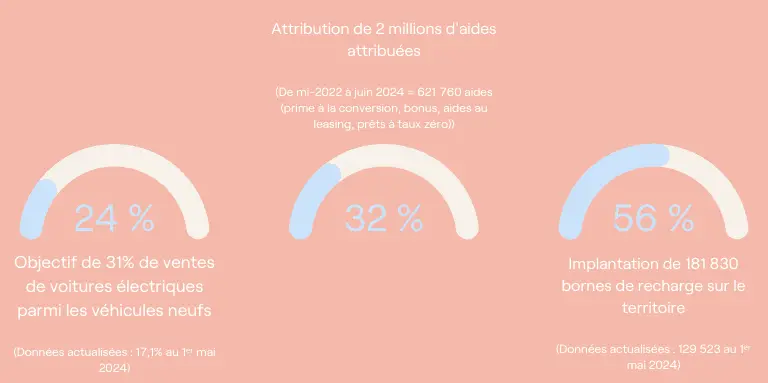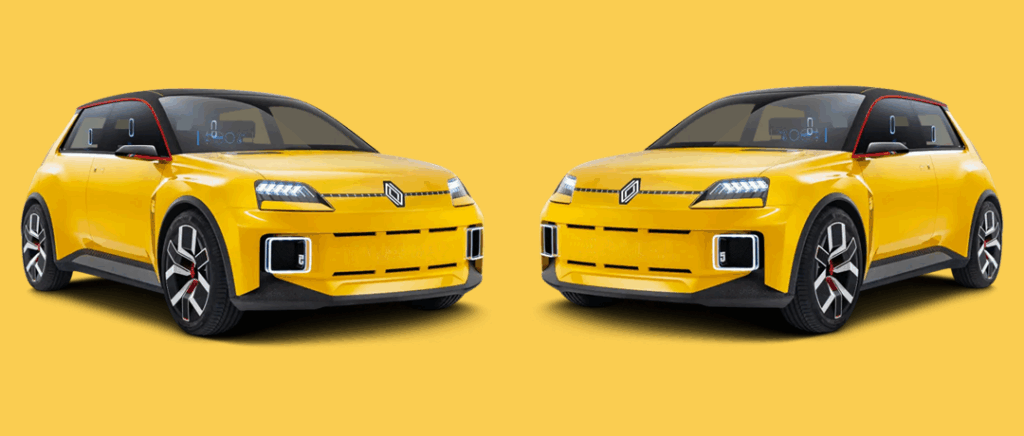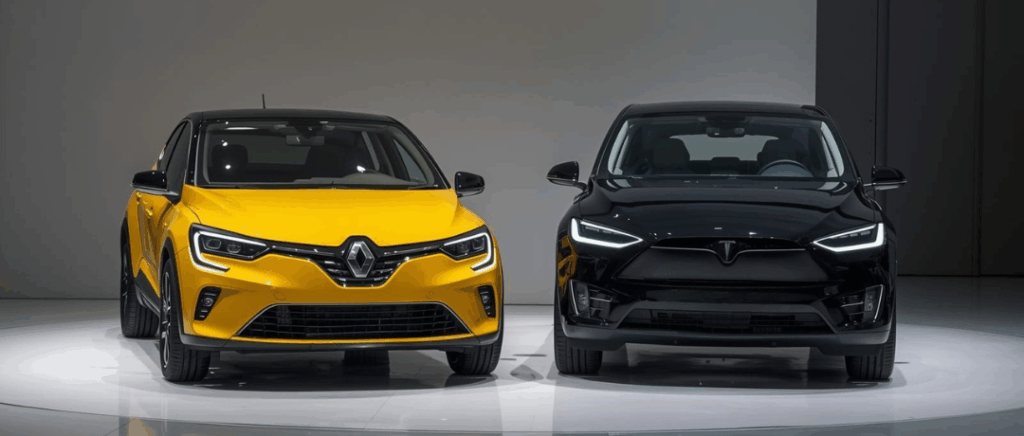With Beev
Switch to
Electric cars
or install your
Charging station
For individuals and businesses
Legislative elections 2024 and electromobility: key information
As stated in the preamble, the government's priority policy is to encourage the switch to electric vehicles for private and business customers in France. To this end, targets have been set to speed up the process.
But what is the current situation? Here are a few charts summarising some of the targets that have been set with a view to banning the sale of combustion engine vehicles from 2035.

Source : Info.gouv.fr
With this in mind, a burning issue seems to have been neglected, according to the Fédération nationale des usagers de transports. In a press release dated Tuesday 18 June 2024, the Fnaut regrets the partial absence of the subject of mobility.
However, this question is of vital importance in several respects:
- Opening up certain areas,
- Improving the inclusion of disadvantaged groups,
- Reducing CO2 emissions (complying with the Paris agreements and achieving the national objective of carbon neutrality by 2050).
Decarbonisation cannot be achieved without a soft mobility policy, which will inevitably involve increasing rail services to encourage the French to switch from car to train.
François Delétraz, Chairman of Fnaut
Shortly afterwards, the Automotive and Mobility (PFA) held a round table on 22 may 2024The event brought together the political parties to discuss the future and their outlook for the automotive industry ahead of the European elections. As a result, 7 political figures were presentanda representative of the French political forces.
The automotive industry is at the forefront of the battle for climate protection and engaged in an historic transformation
Luc Chatel, Chairman of the PFA
A number of topics were discussed at the meeting, including:
- customs barriers,
- the end of combustion engine cars in 2035,
- but also competition from China.
To consult : Tax on Chinese electric cars: the impact on Europe
The debates revealed differences of opinion on green mobilityThese include the end of combustion engine cars in 2035 and the switch to electric cars.
Some parties support all-electricity while others oppose it, illustrating a clear division over future mobility policy in Europe.
Electric mobility and French political parties: a summary
Following the round table on 22 May, the statements made by the parties clearly reveal a division into two groups. On one side, the supporters of the 100 % electric and on the other, the more hesitant.
Political parties against electric mobility
In the French political landscape, several parties have expressed their scepticism about the transition to electric mobility. Their positions, often motivated by economic and social concernsAll these factors deserve special attention if we are to understand the issues surrounding the future of the automotive industry in France.
Indeed, the National Rally and more broadly theEuropean far-right are overwhelmingly in favour ofabandoning the transition to all-electricity.
Some believe that this decision is a reflection of traditional conservatism, while others say that it is necessary to defend the working classes, for whom buying a car is a matter of life and death. electric car is currently very difficult.
The end of the internal combustion engine by 2035 is a slash in the purchasing power of our fellow citizens.
Jordan Bardella, President of Rassemblement National
In short, the far-right party's position on this issue is clear: Jordan Bardella insisted on his intention to revoke the ban on the sale of new combustion engine cars from 2035. In addition, it proposes to reduce VAT on fuels from 20 % to 5.5 %.
Marion Maréchal, of the Reconquête! party, shares the same opinion. She sees the transition to electric vehicles as a "ecological delusion"Forcing Europeans to use Chinese electric cars powered by Chinese wind turbines.
François-Xavier Bellamy, Executive Vice-President of Les Républicains, is also opposed to all-electricity.
Lastly, despite the absence of any explicit reference in her political programme, Manon Aubry also believes that it is not necessary to make an explicit reference in her political programme. not preferable to replace all combustion vehicles with electric ones. This France Insoumise MEP is instead encouraging the development of alternative options.
Even so, these comments need to be qualified, given that she has a number of pro-environmental ideas, including :
- "Plan to phase out nuclear power and carbon-based energies and move towards a 100 % renewable energy mix by 2050".
- "Introduce a European tax on international and intra-European flights, and ban flights within the EU when there is an alternative train journey of less than 4 hours".

Programmes opposed to the development of electric cars: the rundown
As we saw earlier, some parties are expressing reservations or proposing alternative programmes on the subject of electric cars, and more broadly on the ban on the sale of new combustion engine vehicles from 2035.
Here's a summary of programmes not aimed at developing electric cars in France, offering a nuanced perspective on the challenges and concerns associated with this transition.
| POLITICIEN(NE) | PARTI POLITIQUE | POSITION SUR LA MOBILITÉ ÉLECTRIQUE |
|---|---|---|
|
Jordan Bardella
|
National Rally
|
"Repeal the ban on the sale of new internal combustion engine vehicles from 2035".
|
|
François-Xavier Bellamy
|
The Republicans
|
"Repeal the ban on the sale of new combustion-powered vehicles in 2035".
|
|
Marion Maréchal
|
Reconquest
|
"Raise the customs duty to 50 % against 10 % on Chinese electric vehicles".
"Repeal the green pact and everything that has been voted on thermal vehicles".
|
Political parties in favour of electric mobility
The transition to electric mobility is a major challenge for the future of France. Various French political parties have taken clear positions and are proposing ambitious measures to promote electric vehicles.
Recently, through Prime Minister Gabriel Attal, the Renaissance party unveiled its programme.
Only one proposal seems to be moving in the direction of decarbonising the transport sector: a new social leasing plansimilar to that of 2024. This new plan should concern 100,000 electric cars by 2025which is expected to cost 1.3 billion euros to the government.
But that's not all: the main proponents of a mobility 100 % electric are :
- the party of Ecologists-EELV,
- Valérie Hayer, Party Co-President Renaissance,
- Léon Deffontaines, at the head of the Communist Party,
- and Raphaël Glucksmann, from the Socialist Party and Place publique.
Although no mention is made of electric mobility, Léon Deffontaines expresses his desire to "develop genuine industrial cooperation, why not on a European scale, in the field of electric cars".
Finally, in order to make electric vehicles accessible to all, the Communist candidate advocates "an increase in salaries and retirement pensions".
Programmes for the development of electric cars: a summary
Some French political parties are proposing significant measures in their programmes to promote the adoption of clean vehicles.
Here is a summary of the programmes of the main parties in favour of the development of electric cars.
| POLITICIEN(NE) | PARTI POLITIQUE | POSITION SUR LA MOBILITÉ ÉLECTRIQUE |
|---|---|---|
|
Marie Toussaint
|
Ecologists-EELV
|
"Achieve 100 % of renewable energy by 2040 and ban all new fossil fuel projects in Europe".
|
|
Raphaël Glucksmann
|
Socialist Party and Place publique
|
"Reinforce vehicle efficiency and weight standards (...) and the electrification of road transport".
|
|
Valérie Hayer
|
Renaissance
|
"10 million clean vehicles produced in Europe".
|
Conclusion
The visions for a sustainable future in the automotive proposals for the 2024 European elections are varied. Indeed, we note divergent positions among French political parties on electric mobility, highlighting the complexity of the debate surrounding the future of the automobile.
While some are advocating rapid mass adoption of electric vehiclesothers are calling for a more cautious and diversified approach. These varied points of view provide a wealth of food for thought for voters and decision-makers committed to the energy transition.
The direction of European policy on mobility and environmental protection will therefore depend on the choices made by voters.
And don't forget: on 30 June and 7 July 2024, make your voice heard by voting, just like the team. Beev who will vote for the future of our country!
You would like toto electric?
Beev offers multi-brand 100% electric vehicles at the best prices, as well as recharging solutions.
































